A comparative study of “Freedom” in Chuang Tzu and Thoreau’s Walden
- 格式:doc
- 大小:32.50 KB
- 文档页数:4
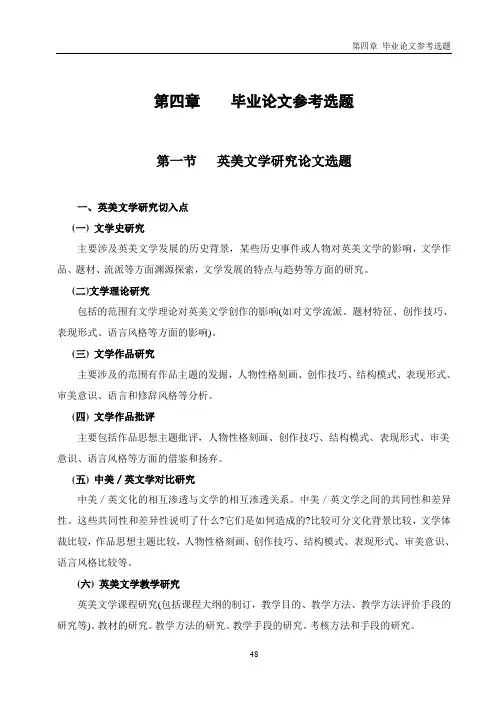
第四章毕业论文参考选题第一节英美文学研究论文选题一、英美文学研究切入点(一) 文学史研究主要涉及英美文学发展的历史背景,某些历史事件或人物对英美文学的影响,文学作品、题材、流派等方面渊源探索,文学发展的特点与趋势等方面的研究。
(二)文学理论研究包括的范围有文学理论对英美文学创作的影响(如对文学流派、题材特征、创作技巧、表现形式、语言风格等方面的影响)。
(三) 文学作品研究主要涉及的范围有作品主题的发掘,人物性格刻画、创作技巧、结构模式、表现形式、审美意识、语言和修辞风格等分析。
(四) 文学作品批评主要包括作品思想主题批评,人物性格刻画、创作技巧、结构模式、表现形式、审美意识、语言风格等方面的借鉴和扬弃。
(五) 中美/英文学对比研究中美/英文化的相互渗透与文学的相互渗透关系。
中美/英文学之间的共同性和差异性。
这些共同性和差异性说明了什么?它们是如何造成的?比较可分文化背景比较,文学体裁比较,作品思想主题比较,人物性格刻画、创作技巧、结构模式、表现形式、审美意识、语言风格比较等。
(六) 英美文学教学研究英美文学课程研究(包括课程大纲的制订,教学目的、教学方法、教学方法评价手段的研究等)。
教材的研究。
教学方法的研究。
教学手段的研究。
考核方法和手段的研究。
(七)其他方面的研究如名家传奇轶事,名作佳话、风波,文学翻译,等等。
二、英美文学研究论文参考选题Analysis of Austen’s Conception of Marriage through Elizabeth’s Choice of Love –an Exploration of Theme in Pride and PrejudiceAn Analysis of the Characteristics of EmmaAn Analysis of the Character of ScarletThe Analysis of Christianity in Uncle Tom's CabinAn Analysis of the Heroine of the Scarlet LetterAn Analysis of Several Robert Frost's Famous PoemsAn Analysis of Tess’s Tragedy in Tess of the d’UrbervillesAppreciation of Literary Language of Pride and PrejudiceThe Bible and Grapes of WrathThe Biblical Influence on Jane EyreA Brief Comment on Shakespeare's the Merchant of V eniceA Brief Comment on the Description of Naturalism of Jack London's the Call of the WildByron's Optimism and Allen Poe's Pessimism—a Comparative study of She Walks in Beauty and To HelenChristian Symbolism in The Grapes of WrathA Comment on Hardy's FatalismA Comment on V anity FairA Comparative Analysis of Sentence Structures in English and Chinese PoetryA Comparative Study of Empathy in English and Chinese PoetryThe Comparisons between Female Characters in Pride and PrejudiceA Comparison between the Themes of Pilgrimage to the West and Pilgrims ProgressThe Conflict between Freewill and Morality—the Social Problems of Postmodern Period in A Clockwork OrangeThe Cosmopolitan Henry James - Comment on His Daisy MillerA Critical Study of William Faulkner's A Rose for Emily: Its Narrative Techniques and StructureThe Cultural Significance of the Matrimonial V alue in Pride and PrejudiceThe Development of Gothic Novels in American LiteratureThe Disillusion of American Dream in American Literary WorksThe Distance between Love and Happiness—On Analysis of the Love between Heatheliff and Catherine in Wuthering HeightsEdgar Allan Poe and the World LiteratureEmily Dickinson and Her Unique PoetryEverything is Connected with Others—Analysis of the Connections between Washington Irving and ProtestantismThe Everlasting Dr. Jekyll and Mr. Hyde——On Robert Louis StevensonFrom Pastoral Stories to Great Tragic Novels: An Analysis of Hardy's NovelsHamlet: His Characters as a HumanistThe Harmony between Character and the EnvironmentHenry Lawson and His BushmanHester Prynne—a Woman Imbued With Dual CharacterThe High Class as Seen in Thacheray's V anity-FairIdeological Similarity between Jane Eyre and Charlotte BronteThe Influence of Symbolism on American LiteratureJane Austen's Art of Irony and Its Rhetoric EffectsJohn Steinbeck and The Grapes of wrathThe Influence of Wars on American Literature―Lamia‖ and ―The Biography of White Lady‖Literary Forms in Newspapers & MagazinesThe Lord of the Rings: the Reality in IllusoryMark Twain: A HumoristMetaphoric Expressions in Poem "x x x"The Modem American Society and The Death of the Salesman Oedipus Complex Shown in Paul in Sons and LoversO.Henry’s Artistic Animation as Seen in His Short StoriesOn Byron's Poem "She Walks in Beauty"On Charles Dickens' Style' and Language in " x x x"On Jane Eyre’s Quality of Independence and Her Attitude towards Love On the Artistic Characteristics of D.H. Lawrence's Short StoriesOn the Character of Shylock in "The Merchant of V enice"On the Development of Jane Eyre's CharacterOn the Paradox of Robinson Crusoe's CharacterOn the Poetical Language of Hardy's Tess of the D'UrbervillesOn Helen KellerHumor and Satire in "Pride and Prejudice"On Housman’s Attitude towards ―Death and War‖On the Linguistic Features of Huckleberry FinnOn the Structure of Dickens's Hard TimesOn T.S. Eliot's Mythological ConsciousnessOn the Social and Artistic V alue of Jane EyreOn the Tragedy of Loman's Family in Death of A SalesmanOn the Tragic Consciousness in A Farewell to ArmsOn the V ividness and Images in Poem " x x x"Oscar Wilde’s Wit – the Art of Paradoxical EpigramParallelism and Contrast of Shakespeare's Dramatic LanguagePatrick White's Contribution to Australian LiteraturePatrick White StylePoints of View and the Mode of Discourse in V anity FairThe Predicament of Southern Belles in William Faulkner’s WorkA Probe into the Feminist Idea of Jane EyreThe Real Influence of Property and Poverty to a Woman—an Analysis of the Marriage Patterns in EmmaA Rebellious Pagan Goddess—an Analysis of Eustacia as a New Woman in The Return of the NativeThe Relationship between Oliver Twist and the Social AspectsRemarks on D. H. Lawrence's Psychological AnalysesRhetorical and Narrative Devices in A Farewell To ArmsA Road to Freedom—Close Reading of "The Adventures of Huckleberry Finn"Santiago: A T ypical Hemingway’s HeroScarlet and Black in The Scarlet LetterShylock: A Complicated CharacterSister Carrie—the Tragic Microcosm of Capitalist Society in the 20th CenturySocial Realty as Reflected in the Poetry of William BlakeSocial Significance as Reflected in The Great GatsbyThe Social Significance of Dickens' Oliver TwistSome Features of Steinbeck's Literary StyleSons and Lovers and its Oedipus ComplexSpiritual Crises in Modern American LiteratureThe Stream of Consciousness in Virginian Woolf's Mrs. DallowayThe Struggle between Divine Nature and Human Nature - A Review of Love in The Thorn BirdsStruggle between Nature and Man - An Ecoliterature Approach to Moby DickA Study on Mark Twain’s Children CharactersThe Sun is ―Down‖– Hemingway’s Life Experiences and His WorksSymbolism in Hawthorne's The Scarlet LetterSymbolism in O'Neill's Major PlaysSyntax in John Milton's "Paradise Lost"Techniques of Theme Production in Wuthering HeightsTess: A Rebellious WomanTess of The D'Urbervilles: An Innocent V ictimThomas Hardy and Pessimism—Tess of the D'Urbervilles Tragic, But Not PessimisticTo the Lighthouse—an Artistic Representation of Virginia Woolf's Philosophy of LifeThe Tragic Color of Ernest Hemingway's NovelsTwo V oices in Emily Dickinson' Poetry—Bisexual Writing Strategy of DickinsonThe Waste Land and The BibleThe Way to the Wild — an Analysis of Jack London's The Call of the WildA World of Alienation – on Jack London’s The Call of the WildWuthering Heights ----The Song of Rebel三、英美文学研究参考文献剑桥大学出版社、上海外语教育出版社:The Cambridge Chaucer Companion乔叟研究The Cambridge Companion to Shakespeare Studies 莎士比亚研究The Cambridge Companion to Greek Tragedy希腊悲剧The Cambridge Companion to English Poetry 英国诗歌The Cambridge Companion to Eighteenth-Century Novel十八世纪英国小说The Cambridge Companion to British Romanticism 英国浪漫主义文学The Cambridge Companion to Modernism 现代主义研究The Cambridge Companion to Milton 弥尔顿The Cambridge Companion to Samuel Johnson 塞缪尔·约翰逊The Cambridge Companion to Thomas Hardy 托马斯·哈代The Cambridge Companion to Jane Austin 简·奥斯丁The Cambridge Companion to Henry James 亨利·詹姆斯The Cambridge Companion to William Faulkner 威廉·福克纳The Cambridge Companion to Ernest Hemingway 厄内斯特·海明威The Cambridge Companion to T.S. Eliot 特·斯·艾略特The Cambridge Companion to Joseph Conrad 约瑟夫·康拉德The Cambridge Companion to James Joyce 詹姆斯·乔伊斯The Cambridge Companion to Eugene O'Neill 尤金·奥尼尔The Cambridge Companion n to Arthur Miller 阿瑟·密勒The Cambridge Companion to Tennessee Williams 田纳西·威廉斯The Cambridge Companion to Oscar Wilde 奥斯卡·王尔德The Cambridge Companion to George Bernard Shaw 萧伯纳The Cambridge Companion to Henry David Thoreau 亨利·戴维·梭罗The Cambridge Companion to Walt Whitman 沃尔特·惠特曼The Cambridge Companion to Herman Melville 赫尔曼·麦尔维尔The Cambridge Companion to Ezra Pound 埃兹拉·庞德The Cambridge Companion to Mark Twain 马克·吐温The Cambridge Companion to Virginia Woolf 弗吉尼亚·伍尔夫The Cambridge Companion to Samuel Beckett 贝克特The Cambridge Companion to American Realism and Naturalism 美国现实主义和自然主义第三节语言与文化研究论文参考选题一、语言与文化研究范围语言与文化的研究范围非常广泛,研究内容极为丰富,有许多题目可做。
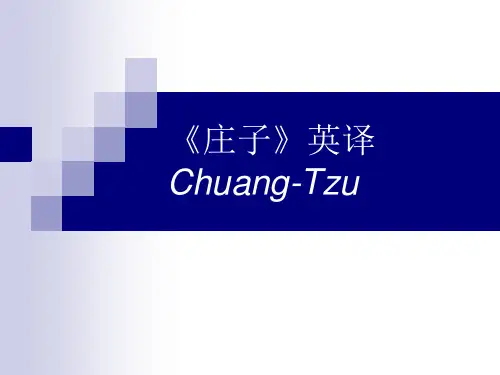
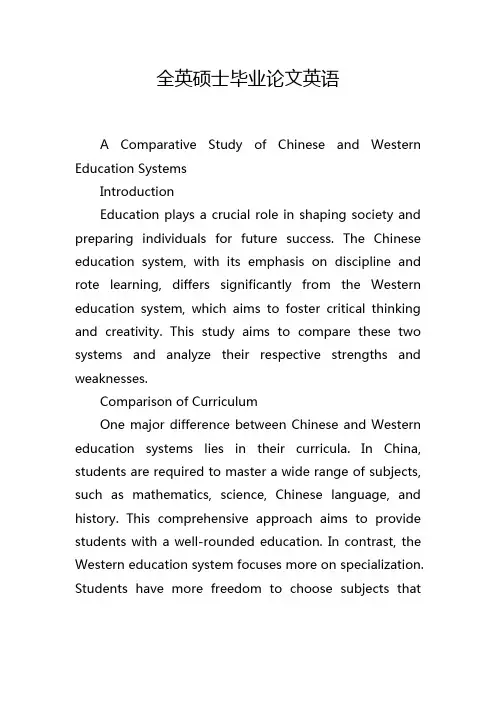
全英硕士毕业论文英语A Comparative Study of Chinese and Western Education SystemsIntroductionEducation plays a crucial role in shaping society and preparing individuals for future success. The Chinese education system, with its emphasis on discipline and rote learning, differs significantly from the Western education system, which aims to foster critical thinking and creativity. This study aims to compare these two systems and analyze their respective strengths and weaknesses.Comparison of CurriculumOne major difference between Chinese and Western education systems lies in their curricula. In China, students are required to master a wide range of subjects, such as mathematics, science, Chinese language, and history. This comprehensive approach aims to provide students with a well-rounded education. In contrast, the Western education system focuses more on specialization. Students have more freedom to choose subjects thatalign with their interests and strengths, enabling them to develop specialized knowledge and skills.Teaching MethodsTeaching methods also greatly differ between Chinese and Western education systems. In China, the teacher is seen as the authority figure who imparts knowledge to students through lectures and demonstrations. Students are expected to listen attentively and take notes. This approach helps students acquire knowledge efficiently but may discourage critical thinking and creativity. In the West, however, the emphasis is on interactive and student-centered learning. Teachers act as facilitators, encouraging student participation, critical thinking, and collaboration. This approach fosters independent thinking and creativity but may result in a slower acquisition of knowledge.Assessment and GradingAssessment and grading methods in Chinese and Western education systems also show differences. In China, examinations are the primary means of assessing students' performance. These exams are often highly competitive and focus on rote memorization rather than understanding or critical thinking. In the West, assessment is more flexible and diverse, including acombination of examinations, coursework, projects, and presentations. This enables students to demonstrate a broader range of skills and knowledge.Parental InvolvementAnother area where Chinese and Western education systems differ is parental involvement. In China, parents play a significant role in their children's education. They often monitor their children's progress closely, providing additional support and resources to ensure academic success. In the West, parental involvement tends to be less intensive, with parents focusing more on their children's overall well-being and personal development.ConclusionBoth the Chinese and Western education systems have their strengths and weaknesses. The Chinese system is known for its rigor and high academic achievement, while the Western system emphasizes creativity and critical thinking skills. By understanding and learning from each other's strengths, it is possible to create a more balanced and effective education system. A combination of the disciplines of the Chinese system and the creativity of the Western system can produce well-rounded individuals who are equipped to succeed in the modern world.。
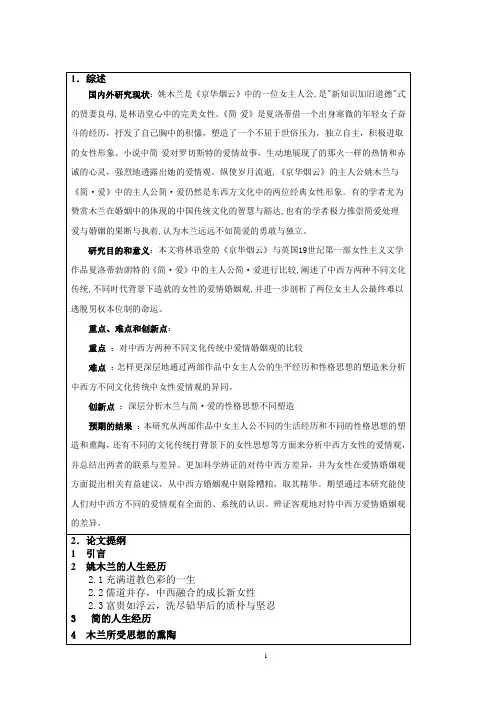
1.综述 .国内外研究现状:姚木兰是《京华烟云》中的一位女主人公,是"新知识加旧道德"式 国内外研究现状 的贤妻良母,是林语堂心中的完美女性。
《简爱》是夏洛蒂借一个出身寒微的年轻女子奋 斗的经历,抒发了自己胸中的积愫,塑造了一个不屈于世俗压力,独立自主,积极进取 的女性形象。
小说中简爱对罗切斯特的爱情故事,生动地展现了的那火一样的热情和赤 诚的心灵,强烈地透露出她的爱情观。
纵使岁月流逝,《京华烟云》的主人公姚木兰与 《简爱》中的主人公简爱仍然是东西方文化中的两位经典女性形象。
有的学者尤为 赞赏木兰在婚姻中的体现的中国传统文化的智慧与豁达,也有的学者极力推崇简爱处理 爱与婚姻的果断与执着,认为木兰远远不如简爱的勇敢与独立。
研究目的和意义:本文将林语堂的《京华烟云》与英国19世纪第一部女性主义文学 研究目的和意义 目的和意义 作品夏洛蒂勃朗特的《简爱》中的主人公简爱进行比较,阐述了中西方两种不同文化 传统,不同时代背景下造就的女性的爱情婚姻观,并进一步剖析了两位女主人公最终难以 逃脱男权本位制的命运。
重点、难点和创新点 重点、难点和创新点: 重点 :对中西方两种不同文化传统中爱情婚姻观的比较 怎样更深层地通过两部作品中女主人公的生平经历和性格思想的塑造来分析 难点 : 中西方不同文化传统中女性爱情观的异同。
创新点 :深层分析木兰与简爱的性格思想不同塑造 本研究从两部作品中女主人公不同的生活经历和不同的性格思想的塑 预期的结果 : 造和熏陶, 还有不同的文化传统打背景下的女性思想等方面来分析中西方女性的爱情观, 并总结出两者的联系与差异。
更加科学辨证的对待中西方差异,并为女性在爱情婚姻观 方面提出相关有益建议,从中西方婚姻观中剔除糟粕,取其精华。
期望通过本研究能使 人们对中西方不同的爱情观有全面的、系统的认识。
辨证客观地对待中西方爱情婚姻观 的差异。
2.论文提纲 . 1 引言 2 姚木兰的人生经历 姚木兰的人生经历 2.1 充满道教色彩的一生 2.2 儒道并存,中西融合的成长新女性 2.3 富贵如浮云,洗尽铅华后的质朴与坚忍 3 简的人生经历 4 木兰所受思想的熏陶i5 简所受思想的熏陶 5.1 在盖兹海德 5.2 在劳沃德学校 5.3 在桑菲尔德 5.4 在莫尔屋 6 7 8 木兰的爱情 简的爱情 两个女主人公爱情的共同局限性 8.1 她们选择爱情的原因 8.2 两个女主人公局限性的相似性 9 结语 3.论文写作进度安排 09年11月24日---11月28日 11月28日---12月15日 完成论文开题报告.与指导教师落实大纲。
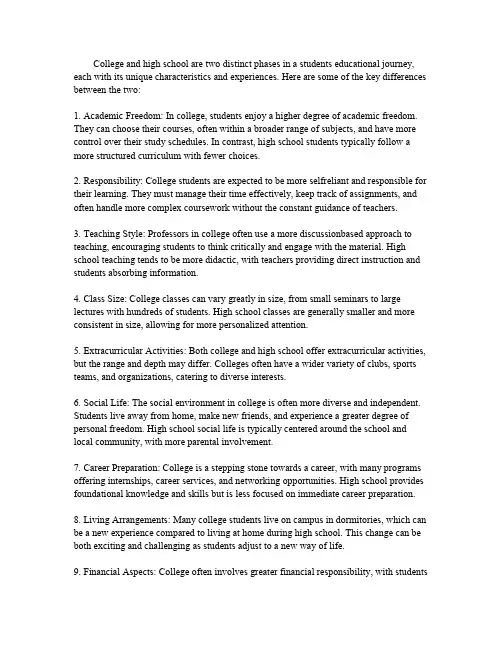
College and high school are two distinct phases in a students educational journey, each with its unique characteristics and experiences. Here are some of the key differences between the two:1. Academic Freedom: In college, students enjoy a higher degree of academic freedom. They can choose their courses, often within a broader range of subjects, and have more control over their study schedules. In contrast, high school students typically follow a more structured curriculum with fewer choices.2. Responsibility: College students are expected to be more selfreliant and responsible for their learning. They must manage their time effectively, keep track of assignments, and often handle more complex coursework without the constant guidance of teachers.3. Teaching Style: Professors in college often use a more discussionbased approach to teaching, encouraging students to think critically and engage with the material. High school teaching tends to be more didactic, with teachers providing direct instruction and students absorbing information.4. Class Size: College classes can vary greatly in size, from small seminars to large lectures with hundreds of students. High school classes are generally smaller and more consistent in size, allowing for more personalized attention.5. Extracurricular Activities: Both college and high school offer extracurricular activities, but the range and depth may differ. Colleges often have a wider variety of clubs, sports teams, and organizations, catering to diverse interests.6. Social Life: The social environment in college is often more diverse and independent. Students live away from home, make new friends, and experience a greater degree of personal freedom. High school social life is typically centered around the school and local community, with more parental involvement.7. Career Preparation: College is a stepping stone towards a career, with many programs offering internships, career services, and networking opportunities. High school provides foundational knowledge and skills but is less focused on immediate career preparation.8. Living Arrangements: Many college students live on campus in dormitories, which can be a new experience compared to living at home during high school. This change can be both exciting and challenging as students adjust to a new way of life.9. Financial Aspects: College often involves greater financial responsibility, with studentspotentially managing loans, scholarships, and parttime jobs to cover tuition and living expenses. High school students typically do not face these financial burdens.10. Transition to Adulthood: The college years are a critical period of transition into adulthood, where students learn to navigate independence, make important life decisions, and prepare for their future careers.In conclusion, while both high school and college are essential stages in education, they offer different experiences that shape students in unique ways. The transition from high school to college is a significant milestone, marking the beginning of a new chapter in personal and academic growth.。
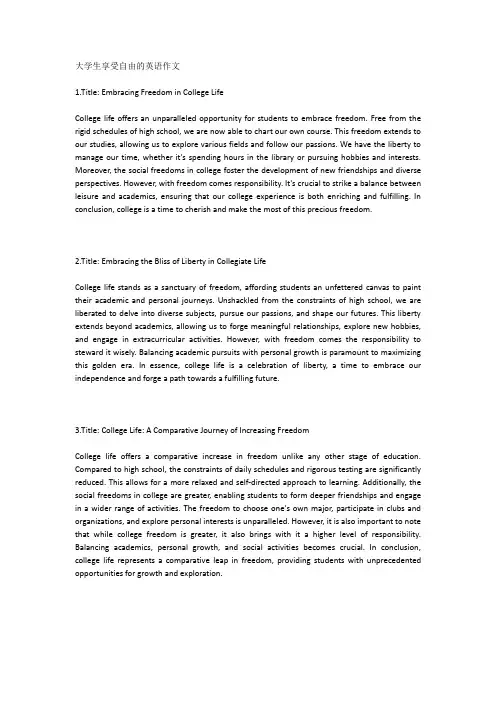
大学生享受自由的英语作文1.Title: Embracing Freedom in College LifeCollege life offers an unparalleled opportunity for students to embrace freedom. Free from the rigid schedules of high school, we are now able to chart our own course. This freedom extends to our studies, allowing us to explore various fields and follow our passions. We have the liberty to manage our time, whether it's spending hours in the library or pursuing hobbies and interests. Moreover, the social freedoms in college foster the development of new friendships and diverse perspectives. However, with freedom comes responsibility. It's crucial to strike a balance between leisure and academics, ensuring that our college experience is both enriching and fulfilling. In conclusion, college is a time to cherish and make the most of this precious freedom.2.Title: Embracing the Bliss of Liberty in Collegiate LifeCollege life stands as a sanctuary of freedom, affording students an unfettered canvas to paint their academic and personal journeys. Unshackled from the constraints of high school, we are liberated to delve into diverse subjects, pursue our passions, and shape our futures. This liberty extends beyond academics, allowing us to forge meaningful relationships, explore new hobbies, and engage in extracurricular activities. However, with freedom comes the responsibility to steward it wisely. Balancing academic pursuits with personal growth is paramount to maximizing this golden era. In essence, college life is a celebration of liberty, a time to embrace our independence and forge a path towards a fulfilling future.3.Title: College Life: A Comparative Journey of Increasing FreedomCollege life offers a comparative increase in freedom unlike any other stage of education. Compared to high school, the constraints of daily schedules and rigorous testing are significantly reduced. This allows for a more relaxed and self-directed approach to learning. Additionally, the social freedoms in college are greater, enabling students to form deeper friendships and engage in a wider range of activities. The freedom to choose one's own major, participate in clubs and organizations, and explore personal interests is unparalleled. However, it is also important to note that while college freedom is greater, it also brings with it a higher level of responsibility. Balancing academics, personal growth, and social activities becomes crucial. In conclusion, college life represents a comparative leap in freedom, providing students with unprecedented opportunities for growth and exploration.。
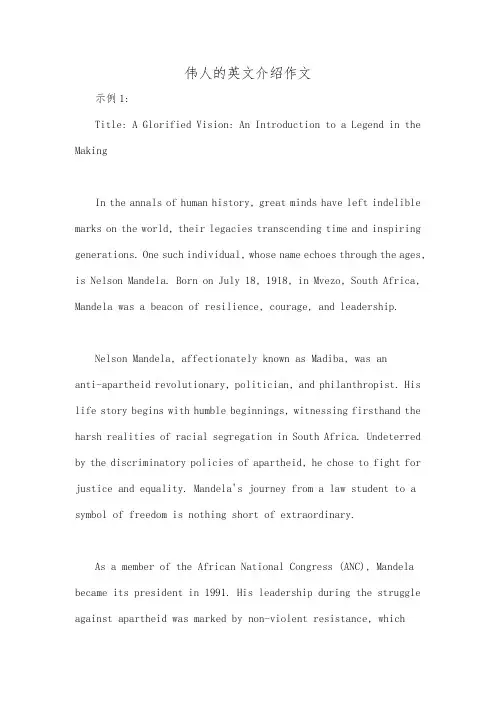
伟人的英文介绍作文示例1:Title: A Glorified Vision: An Introduction to a Legend in the MakingIn the annals of human history, great minds have left indelible marks on the world, their legacies transcending time and inspiring generations. One such individual, whose name echoes through the ages, is Nelson Mandela. Born on July 18, 1918, in Mvezo, South Africa, Mandela was a beacon of resilience, courage, and leadership.Nelson Mandela, affectionately known as Madiba, was ananti-apartheid revolutionary, politician, and philanthropist. His life story begins with humble beginnings, witnessing firsthand the harsh realities of racial segregation in South Africa. Undeterred by the discriminatory policies of apartheid, he chose to fight for justice and equality. Mandela's journey from a law student to a symbol of freedom is nothing short of extraordinary.As a member of the African National Congress (ANC), Mandela became its president in 1991. His leadership during the struggle against apartheid was marked by non-violent resistance, whichearned him international recognition. After being arrested and spending 27 years in prison, including a stretch on Robben Island, he emerged as a symbol of hope. His unwavering commitment to peace and reconciliation was exemplified by his famous statement, "I am prepared to die," demonstrating his steadfastness in the face of adversity.Upon his release in 1990, Mandela played a pivotal role in negotiating an end to apartheid and becoming the first black president of South Africa in 1994. His presidency was marked by his tireless efforts to heal the nation's wounds, bridge racial divides, and promote social cohesion. Mandela's signature policy, the Truth and Reconciliation Commission, aimed at fostering understanding and forgiveness, making him a champion of peace.Beyond his political achievements, Mandela's personal qualities were equally commendable. He embodied grace, humility, and a deep sense of humanity. His ability to forgive those who had wronged him, including his former jailers, demonstrated a level of compassion that few can emulate. Mandela's commitment to education and health care for all South Africans was a testament to his belief in the transformative power of social upliftment.Mandela's legacy extends far beyond South Africa. He was awarded the Nobel Peace Prize in 1993, becoming the first black person to receive this prestigious honor. His global influence inspired countless others to stand up against injustice, regardless of their background or circumstances. Mandela's message of unity and equality resonated worldwide, making him a true global icon.In conclusion, Nelson Mandela is not just a伟人 (great man) in the traditional sense; he is a towering figure whose life and actions have shaped the course of history. His unwavering commitment to justice, forgiveness, and the betterment of humanity has made him an enduring symbol of hope and progress. Through his life, we learn that even in the darkest of times, one person's courage and determination can bring about change on a global scale.中文翻译:标题:伟大的典范:一段传奇的诞生在人类历史的篇章中,一些伟人的身影熠熠生辉,他们的事迹超越了时间,激励着世世代代。
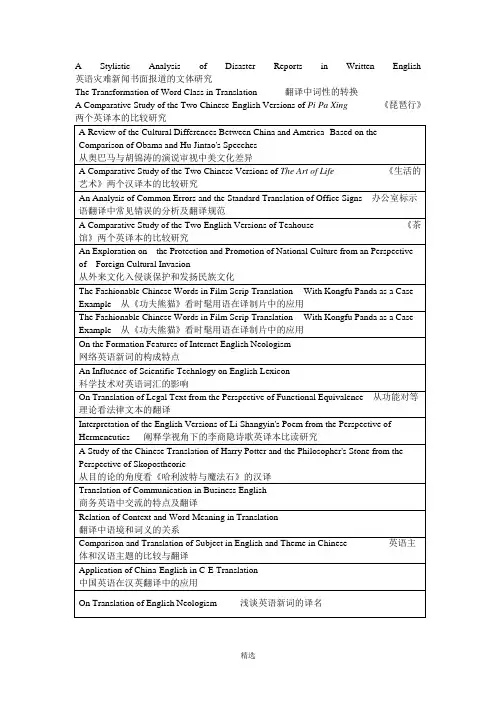
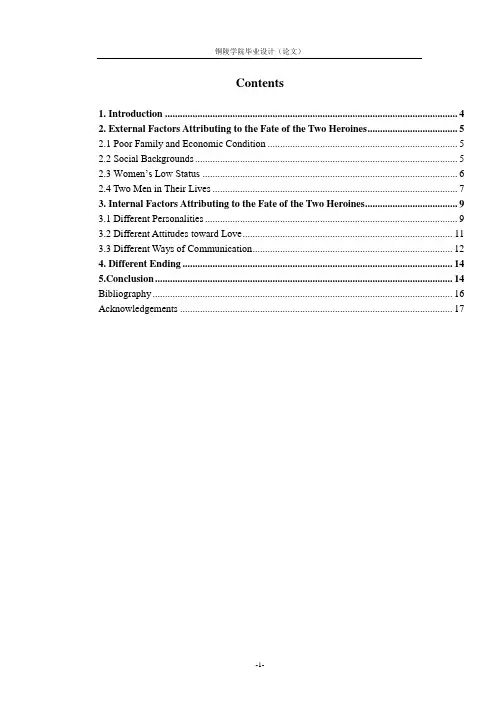
Contents1. Introduction (4)2. External Factors Attributing to the Fate of the Two Heroines (5)2.1 Poor Family and Economic Condition (5)2.2 Social Backgrounds (5)2.3 Women’s Low Status (6)2.4 Two Men in Their Lives (7)3. Internal Factors Attributing to the Fate of the Two Heroines (9)3.1 Different Personalities (9)3.2 Different Attitudes toward Love (11)3.3 Different Ways of Communication (12)4. Different Ending (14)5.Conclusion (14)Bibliography (16)Acknowledgements (17)苔丝与海斯特悲剧命运的对比分析摘要苔丝·德伯和海斯特·白兰分别是哈代和霍桑作品中塑造的两个著名的女性形象。
虽然她们生活在不同的时代,不同的区域,但是两人却有着许多极其相似的地方,特别是她们的悲剧命运和起因。
她们都有着美丽的外表和纯朴善良的心;她们都是两个男人的受害者;她们都经历了痛苦、磨难、反抗和追求幸福的心灵历程。
她们的遭遇都反映了传统道德、虚伪的宗教及男权思想对妇女的压抑和摧残,她们的反抗和追求幸福的历程同样表现了女性对于平等权利和自由的追求。
她们的社会背景和经历极其相似:相似的家庭背景和经济条件,当时妇女地位的低下和两人相似的悲惨遭遇,但同时两个人在性格上又有着很大的不同,从而导致了她们最终命运截然不同。
一个是在与命运的抗争中获得了新生,另一个则在不幸的挣扎中遭到毁灭。
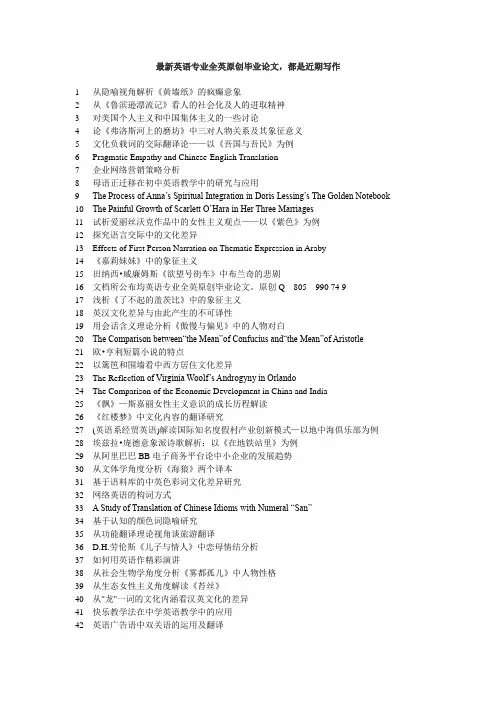
最新英语专业全英原创毕业论文,都是近期写作1 从隐喻视角解析《黄墙纸》的疯癫意象2 从《鲁滨逊漂流记》看人的社会化及人的进取精神3 对美国个人主义和中国集体主义的一些讨论4 论《弗洛斯河上的磨坊》中三对人物关系及其象征意义5 文化负载词的交际翻译论——以《吾国与吾民》为例6 Pragmatic Empathy and Chinese-English Translation7 企业网络营销策略分析8 母语正迁移在初中英语教学中的研究与应用9 The Process of Anna’s Spiritual Integration in Doris Lessing’s The Golden Notebook10 The Painful Growth of Scarlett O’Hara in Her Three Marriages11 试析爱丽丝沃克作品中的女性主义观点——以《紫色》为例12 探究语言交际中的文化差异13 Effects of First Person Narration on Thematic Expression in Araby14 《嘉莉妹妹》中的象征主义15 田纳西•威廉姆斯《欲望号街车》中布兰奇的悲剧16 文档所公布均英语专业全英原创毕业论文。
原创Q 805 990 74 917 浅析《了不起的盖茨比》中的象征主义18 英汉文化差异与由此产生的不可译性19 用会话含义理论分析《傲慢与偏见》中的人物对白20 The Comparison between―the Mean‖of Confucius and―the Mean‖of Aristotle21 欧•亨利短篇小说的特点22 以篱笆和围墙看中西方居住文化差异23 The Reflec tion of Virginia Woolf’s Androgyny in Orlando24 The Comparison of the Economic Development in China and India25 《飘》—斯嘉丽女性主义意识的成长历程解读26 《红楼梦》中文化内容的翻译研究27 (英语系经贸英语)解读国际知名度假村产业创新模式—以地中海俱乐部为例28 埃兹拉•庞德意象派诗歌解析:以《在地铁站里》为例29 从阿里巴巴BB电子商务平台论中小企业的发展趋势30 从文体学角度分析《海狼》两个译本31 基于语料库的中英色彩词文化差异研究32 网络英语的构词方式33 A Study of Translation of Chinese Idioms with Numeral ―San‖34 基于认知的颜色词隐喻研究35 从功能翻译理论视角谈旅游翻译36 D.H.劳伦斯《儿子与情人》中恋母情结分析37 如何用英语作精彩演讲38 从社会生物学角度分析《雾都孤儿》中人物性格39 从生态女性主义角度解读《苔丝》40 从"龙"一词的文化内涵看汉英文化的差异41 快乐教学法在中学英语教学中的应用42 英语广告语中双关语的运用及翻译43 消费文化理论视角下的《嘉莉妹妹》44 写作教学中的范文教学45 从对等功能理论看《卡斯特桥市长》中的比喻修辞46 佛罗多与亚拉冈:悲剧虚构型模式中的低模仿英雄与喜剧虚构型模式中的高模仿英雄47 功能对等视角下记者招待会古诗词翻译策略研究48 The Differences of Beauty Standards Between China and America49 《宠儿》中黑人女性的自我意识50 从功能理论角度分析电影《点球成金》字幕翻译51 托马斯·哈代《还乡》中的时间与叙事52 浅谈西方情人节及其对中国文化的影响53 修辞手法在TED演讲中的运用54 浅谈中学英语教学中的情感教学方法55 “三美论”观照下的《再别康桥》英译本比较研究56 商务英语交流中委婉语的语用功能研究57 从中西婚礼文化看中西方文化差异58 浅析爱德华•摩根•福斯特《霍华德庄园》中的主题思想59 《简•爱》的女性主义解读60 从皮普的身份扭曲浅析狄更斯《远大前程》中人文主义的“不道德”61 从“老人与海”译本比较研究看理解在翻译中的重要性62 A Lonely but Strong-willed Soul A Character Analysis of Ellen Weatherall in The Jilting of Granny Weatherall63 Exploring Differences Between Chinese and English Compliments64 涉外商务用餐中的非言语交际65 礼仪在商务谈判中的应用66 电影《超人:钢铁之躯》中的西方个人英雄主义体现67 中西方创世神话文化的比较68 中西饮食文化差异探析69 从《夜莺与玫瑰》看王尔德唯美主义的道德观70 Linguistic Communication Skills in Business Negotiations71 A Study on the Cross-Cultural Management in the Sino-American Joint-Venture Enterprises --With Special Reference to Changan & Ford Motor Company72 中西方礼貌原则及其差异对比研究73 《喧哗与骚动》中的现代主义74 从模因论角度下谈广告语的仿译75 An Analysis of Marguerite’s Tragedy in The Lady of the Camellias76 罗伯特•弗罗斯特田园诗歌意象的象征意义77 相同之爱,不同诠释——从美剧《吉尔莫女孩》看东西方母女关系之异同78 A Study on Narrative Techniques in A Rose for Emily79 An Analysis of Two Main Characters in Moby Dick80 Cultural Connotation and Translation of Animal Words in Chinese and English81 动物词汇的英汉互译策略82 对《儿子与情人》中女性形象的分析83 Naturalism in Sister Carrie84 商务英语函电的语言和文体特征及其翻译85 汉语中英源外来词翻译研究86 To Obey or Rebel –A Study of Female Characters in Moment in Peking87 浅析哈克贝利的叛逆精神88 悖论式的唯美主义--论王尔德的《道连•格雷的画像》89 游戏在小学英语词汇学习中的运用90 对英语影视片名翻译的研究91 弗吉尼亚•伍尔夫《到灯塔去》两性意象的象征研究92 论《野性的呼唤》中对人和自然和谐的呼唤93 论托妮莫里森《最蓝的眼睛》中的母女关系94 论英汉谚语的起源差异95 论“黑”字所体现的对美国黑人的种族歧视96 关于英语课堂中教师体态语的研究97 浅论《儿子与情人》中劳伦斯的心里分析技巧98 从《飘》中人物性格分析看适者生存的道理99 《在路上》:垮掉一代的反叛与追求100 解析斯嘉丽的性格及其对现代社会女性的借鉴意义101 小学英语课堂提问策略研究102 On Translation of English Idioms103 Psychoanalytical Study of Kate Chopin’s The Awakening104 《雾都孤儿》中的善与恶105 论高中英语写作教学中的文化意识培养106 英语电影片名汉译研究107 从叔本华的哲学思想角度简析《德伯家的苔丝》中苔丝的悲剧108 Struggle and Compromise in North and South109 英汉鸟类词汇文化内涵比较110 小说《面纱》中的中国形象分析111 伊丽莎白.贝内特与简.爱的婚姻观之比较112 A Comparative Analysis of English V ocabulary Teaching between China and America at the Primary and Secondary School Level113 英文电影名称翻译中文化顺应的影响114 分析文化差异在国际商务谈判中的影响115 新加坡英语和英国英语比较研究116 试论高中英语学习者英语听力能力的培养117 Cultural Connotations of Basic Color Terms in English and Chinese118 浅谈儿童文学在儿童成长中的作用-弗朗西斯•霍奇森•伯内特《小公主》和《秘密花园》之比较119 浅析以学生为中心的中学英语口语教学120 奥巴马演讲词的人际意义研究121 A New Woman’s Journey in To the Lighthouse122 The Travel of Freedom—An analysis of The Adventures of Huckleberry Finn123 我们如何避免翻译中的中式英语124 《哈利波特》中的励志精神125 浅析《儿子与情人》中的恋母情结126 论《吉姆老爷》中的英雄主义(开题报告+论)127 中国现代散文风格精彩再现——评张培基教授《英译中国现代散文选》128 不可缺少的书信——《傲慢与偏见》中书信功能的研究129 《玻璃动物园》中的逃避主义解读130 论《远离尘嚣》中女主人公的悲剧原因131 英语词汇教学中联想记忆法之研究132 快餐食品对中西方传统饮食文化的影响力133 英汉委婉语的文化对比研究——以“死亡”委婉语为例134 《金色笔记》与多丽丝•莱辛的女性主义思想135 美国西部文学中的牛仔形象所体现出的美国英雄主义136 跨文化视角视阈下英语电影片名的翻译研究137 美国广告语中的会话含义研究138 浅析中美家庭教育的差异139 用功能对等原则分析广告标语的英汉互译140 解读《最蓝的眼睛》中的姐妹情谊141 《麦田里的守望者》中霍尔顿从抗拒到妥协的精神之旅142 Elements on the Growth of Mary in The Secret Garden143 中美肥胖问题比较研究144 浅析商务谈判中的恭维语应用145 英语报刊标题的词汇特点和修辞特点146 A Study on the Translation of News Headlines from English Into Chinese147 论圣经诗篇的修辞特点148 《夜莺颂》的翻译技巧探究149 挣脱世俗枷锁,定义自我人生意义——解读毛姆《人生的枷锁》中的人生哲学150 网络微博语言特征151 分析《基督山伯爵》爱德蒙的二重性格152 天使还是悲剧制造者——浅析安吉克莱尔对苔丝悲剧的影响153 从《理智与情感》中看人格与性格对婚姻选择的影响154 Ezra Pound’s Attempt to Find a Savior in His Poetry Writing155 Racism in Heart of Darkness156 《纯真年代》女性意识探析157 词汇的语义关系及其在初中英语词汇教学中的运用158 On the Irony in Pride and Prejudice159 爱米莉•狄金森诗歌中的植物隐喻160 论《第二十二条军规》的写作手法161 《长日入夜行》中玛丽的悲剧和反抗162 大学英语教师课堂话语礼貌现象研究163 “误译”现象的合理性探析164 Principles in the Translation of Legal English165 A Comparative Study on Lin Daiyu and Xue Baochai166 The Elementary Stage Translation Teaching Design for Undergraduate English Majors 167 美国黑人社会地位的历史演变168 《麦琪的礼物》的叙事技巧分析169 美国牛仔形象演变和西部电影发展的研究170 浅析中西方婚礼习俗的差异和融合171 从《少年派的奇幻漂流记》论人性与兽性172 第二语言习得中的正迁移与负迁移173 《女勇士》中的华裔女性形象浅析174 讨论型课堂与英语学习175 A Comparison of Chinese and Western Taboos of Social Communication 176 浅谈来自《圣经》的英语习语177 论《简爱》中的经济意识178 中美肢体语言的差异179 中英颜色词及象征意义180 汤姆叔叔的小屋中汤姆形象分析181 《玻璃动物园》中的逃避主义解读182 差异、对立与和谐——浅析伍尔夫的双性同体观183 论文化负载词的英译-以鲁迅小说《祝福》的英译本为例184 中美服饰的文化差异分析185 合作学习理论在中学英语课堂中的应用186 从关联理论角度分析《绝望主妇》中话语标记语I mean187 The Poet’s Identity in Keats’s Six Odes188 花园小径句在英语阅读中的分析189 从文化视角看中美家庭教育差异190 论小说《看不见的人》中的象征主义191 翻译呼啸山庄的感想(英译中)192 《玻璃动物园》中的逃避主义解读193 论《白鲸》象征手法的运用194 论《荆棘鸟》中德罗海达的寓意及其对命运的影响195 从《瓦尔登湖》看梭罗的自然观196 英汉称谓语对比分析197 《祝福》两个英译本翻译中文化缺失现象的对比研究198 从目的论的角度谈商标翻译的原则及技巧199 英语委婉语的认知分析200 从认知角度比较英日语言的空间隐喻。
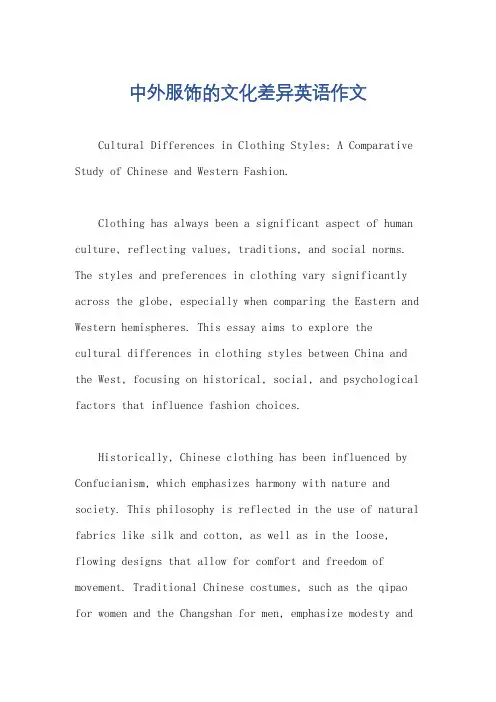
中外服饰的文化差异英语作文Cultural Differences in Clothing Styles: A Comparative Study of Chinese and Western Fashion.Clothing has always been a significant aspect of human culture, reflecting values, traditions, and social norms. The styles and preferences in clothing vary significantly across the globe, especially when comparing the Eastern and Western hemispheres. This essay aims to explore thecultural differences in clothing styles between China and the West, focusing on historical, social, and psychological factors that influence fashion choices.Historically, Chinese clothing has been influenced by Confucianism, which emphasizes harmony with nature and society. This philosophy is reflected in the use of natural fabrics like silk and cotton, as well as in the loose, flowing designs that allow for comfort and freedom of movement. Traditional Chinese costumes, such as the qipao for women and the Changshan for men, emphasize modesty andrespect for authority. These garments often featureintricate embroidery and patterns, symbolizing wealth, status, and cultural heritage.On the other hand, Western fashion has been shaped by a combination of factors, including the influence of the Renaissance, the Industrial Revolution, and modern consumer culture. Western clothing tends to emphasize individuality and creativity, with a focus on fitting the body and showcasing physical attributes. Designers often experiment with materials, cuts, and colors, creating diverse and often edgy styles. Western fashion also tends to be more seasonal, with trends that change rapidly, influenced by celebrities, social media, and the entertainment industry.Socially, Chinese clothing styles reflect a strong sense of community and hierarchy. In traditional Chinese culture, clothing was often used as a marker of social status and occupation. For example, officials wore robes of different colors and designs to indicate their rank and position. Even today, in modern China, there are still subtle cues in clothing that suggest a person's socialstatus or occupation.In contrast, Western fashion tends to be more individualistic, with people expressing their unique personalities and tastes through their clothing choices. Western society tends to be more accepting of diverse fashion choices, from casual streetwear to formal evening wear. This diversity reflects the emphasis on individual freedom and creativity in Western culture.Psychologically, Chinese clothing styles are often seen as a form of self-control and discipline. The emphasis on modesty and harmony in traditional Chinese fashion reflects a cultural belief that appearance should not draw undue attention to oneself. Clothing is used to maintain a sense of balance and order, rather than as a means of expressing one's inner self.In contrast, Western fashion is often associated with self-expression and self-fulfillment. Clothing choices are seen as a way to communicate one's values, beliefs, and emotions. Western fashion trends often reflect social andpolitical movements, serving as a platform for individuals to express their opinions and make a statement.In conclusion, the cultural differences in clothing styles between China and the West are rooted in their respective histories, social norms, and psychological orientations. Chinese fashion emphasizes modesty, harmony, and social status, while Western fashion values individuality, creativity, and self-expression. Understanding these differences can help us appreciate the rich diversity of fashion choices across the globe and the ways they reflect the unique cultural identities of different communities.。
I.Examine the Chinese Culture according to Kluckhohn and Strodtbeck’s Model.ment on ONE of the following statements, applying Kluckhohn and Strodtbeck’s Model.1)Nurture is above nature.2)Man decides on the fate.3)Circumstances decide on the fate.4)I am the captain of my soul, the captain of my fate.5)One does not make the wind but is blown by it.6)All things are possible.7)If a man does not keep pace with his companions, perhaps it is because he hears adifferent drummer.8)When a man gets to the top, all his friends and relations get there with him.III.Write an essay on “Individualism and C ollectivism”. The subtitles below are for your reference.1)The way you are individualistic / collectivistic.2)Some examples of individualism in China.3)Some collectivistic traits in Western society.IV.Other suggested topics for log writing.1. A comparative study on attitudes toward privacy in Western and Chinese cultures2. A study on the differences between Western friendship and Chinese friendshippare the Western individualistic culture with the Chinese collectivist culture4. A comparative study on Chinese martial artists with the Western knights5. A study on the impacts of psychological factors on international communicationpare the differences of gift-giving and gift-receiving in Western culture and Chineseculture by exploring their deep cultural structure7. A comparative study on some culture-loaded words/some color words in Chinese andAmerican Englishpare some typical nonverbal behavior in Chinese and Western culturespare different negotiation styles of Chinese, American, German and French cultures10.A comparative study on the Eastern and Western thought pattern11.A study on gender difference in cross-gender communication12.A comparative study on Western and Chinese painting / architecture13.A comparative study on Western and Chinese clothes14.A comparative study on school education in America and China15.A comparative study on family education in America and China16.A comparative study on the understanding of freedom in America and China17.A comparative study on wedding customs in different countries18.A comparative study on Western and Chinese advertising19.A comparative study on food culture in America / Western countries and China20.A comparative study on wine culture in America / Western countries and China21.A comparative study on journalism in America / Western countries and China。
英美文学对比英语作文标题,A Comparative Study of English and American Literature: Implications for English Composition。
English and American literature stand as two pillars in the realm of literary arts, each with its distinct characteristics, themes, and styles. This essay aims to explore the divergences and convergences between Englishand American literature and analyze their implications for English composition.Firstly, let's delve into the historical and cultural contexts of English and American literature. English literature, rooted in the rich history of the British Isles, spans from the Anglo-Saxon period to the present day. It reflects the socio-cultural dynamics, traditions, andvalues of England and its former colonies. On the other hand, American literature emerged as a distinct entity during the 17th and 18th centuries, influenced by various cultural and ethnic groups, including Native American,African, and European traditions. It embodies the spirit of exploration, individualism, and the pursuit of the American Dream.One of the striking differences between English and American literature lies in their thematic focus. English literature often explores themes of tradition, class, and societal norms, exemplified in works like Jane Austen's "Pride and Prejudice" and Charles Dickens' "Great Expectations." On the contrary, American literature tends to emphasize themes of freedom, identity, and the frontier spirit, as seen in Ralph Waldo Emerson's essays and Mark Twain's "Adventures of Huckleberry Finn."Moreover, the styles and literary techniques employedin English and American literature vary significantly. English literature is characterized by its formal language, intricate plot structures, and nuanced character development. Writers like William Shakespeare and Virginia Woolf are renowned for their mastery of language and psychological depth. In contrast, American literature often adopts a more colloquial and direct style, with an emphasison vivid imagery and regional dialects. Writers such as Ernest Hemingway and Toni Morrison capture the essence of American life through their concise yet evocative prose.The cultural and geographical landscapes depicted in English and American literature also contribute to their distinctiveness. English literature often portrays the pastoral beauty of the English countryside, the complexities of urban life in London, and the nostalgia for a bygone era. In contrast, American literature encompasses a diverse range of settings, from the rugged landscapes of the American West to the bustling streets of New York City. This diversity reflects the vastness of the American continent and the multiplicity of its cultural influences.Despite these differences, English and American literature share common themes and motifs that transcend national boundaries. Both traditions grapple with the complexities of human nature, the search for meaning in a rapidly changing world, and the enduring quest for self-expression. Moreover, they have influenced each other in profound ways, with English literature shaping the earlydevelopment of American writers and American literature exerting its influence on later generations of English authors.The study of English and American literature holds significant implications for English composition. By familiarizing oneself with the diverse traditions andstyles of these two literary canons, writers can enrichtheir own creative repertoire and broaden their understanding of language and storytelling. Moreover, the comparative analysis of English and American literature encourages critical thinking and cultural awareness, fostering a deeper appreciation for the interconnectednessof global literary traditions.In conclusion, the comparative study of English and American literature reveals a fascinating tapestry of themes, styles, and cultural influences. While eachtradition possesses its unique characteristics, they are bound together by a shared commitment to the art of storytelling and the exploration of the human experience.By examining the nuances of English and American literature,writers can gain valuable insights into the craft of English composition and contribute to the ongoing dialogue of literary creativity.This essay explores the contrasting features of English and American literature and their implications for English composition. By examining their historical contexts, thematic concerns, stylistic elements, and cultural landscapes, we gain a deeper understanding of the rich tapestry of literary traditions that shape our world. Through the comparative study of English and American literature, we can appreciate the diversity of human experience and enrich our own creative endeavors in the realm of English composition.。
过度的自由对大学生来说有利有弊英语作文【中英文版】Excessive freedom can be a double-edged sword for college students.On one hand, it fosters independence and creativity, allowing them to explore their interests and potential.On the other hand, without proper guidance, this liberty may lead to procrastination, lack of focus, and even academic failure.对于大学生来说,过度的自由犹如一把双刃剑。
一方面,它能培养独立性和创造力,让学生探索自己的兴趣和潜力。
另一方面,如果没有适当的引导,这种自由可能导致拖延、注意力分散,甚至学业失败。
Freedom is essential for personal growth, but too much of it can lead to a lack of discipline.College students need to strike a balance between enjoying their freedom and maintaining a sense of responsibility towards their studies and future careers.自由对于个人成长至关重要,但过度的自由可能导致纪律松懈。
大学生需要在享受自由与对学业及未来职业负责之间找到平衡。
The perks of excessive freedom, such as flexible schedules and fewer restrictions, can help students develop time management skills and learn to prioritize their tasks.However, this freedom can also result in a lack of structure, making it difficult for some students to stay on track.过度自由的优点,如灵活的时间表和较少的限制,可以帮助学生培养时间管理技巧和学会优先处理任务。
A COMPARATIVE STUDY OF CULTURAL DIFFERENCES IN CHINESE AND WESTERN TABLE MANNERSA Thesispresented tothe College of Foreign LanguagesChongqing University of Posts and TelecommunicationsIn Partial Fulfillmentof the Requirements for the DegreeBachelor of ArtsbyZhou YiJune 2011摘要近年来,随着国际贸易的迅猛发展,信息和交通运输技术的快速提高使国与国之间的联系更加频繁,跨文化交际已经成为人们生活中不可或缺的内容。
在这种大的背景下,我们必须了解不同文化下的各种差异,具备跨文化交际能力。
今天,餐桌礼仪已经逐渐成为影响跨文化交际成功与否的重要因素之一。
但对于各国在餐桌礼仪上的差异,人们总是无意识地会以本民族或群体的文化为标准,理解或评价另一民族或群体的文化,这往往会导致误解的发生。
所以为了减少在跨文化交际当中的误解与冲突,我们就应该研究和理解深藏在餐桌礼仪背后的文化因素。
关键字:餐桌礼仪;差异;文化;原因AbstractRecent years, with the rapid development of international trade, the fast improvement of information and transportation technology, the contact between countries is more frequent. Intercultural communication has become an indispensable element in people's lives. Therefore, we must know the differences between different cultures to have the ability of cross-culture communication.Nowadays, it has already been one of the most important elements that have a great influence on intercultural communication. However, when understanding and evaluating the culture of another nation, people always treat their own culture as the standard. Thus, in order to reduce the misunderstandings and conflicts in cross-cultural communication, we should carefully study and understand the cultural factors through table manners.Key words: table manners; differences; culture; reasonsOutlineTitle: A Comparative Study of Cultural Differences in Chinese and Western Table MannersThesis Statement: Chinese and western table manners differ in tableware, arrival of time, atmosphere, seat arrangement and topic.1.The background to research the differences between Chinese and Westerntable manners.2.Differences in dining etiquette2.1Differences in tableware2.2Differences in arrival of time2.3Differences in atmosphere on table2.4Differences in seating arrangement2.5Differences in the topic on table3.The causes of different dining custom3.1The different origins of Chinese etiquette and the Western etiquette3.2The Impact of the Western Culture and Chinese Culture on Etiquette3.3The Impact of Different Hierarchism of People Status on Etiquette3.4The differences in religious faith4.ConclusionBibliography1.The background to research the differences betweenChinese and Western table manners.In the 21st century, intercultural communication has become an indispensable content in people‟s life. Due to the regional differences, different nationalities and states have formed different cultures. Cooking culture and table manners play a significant role of nonverbal culture in cross-cultural communication. Since the natural environment and the way people work are distinct, Chinese and western etiquette differs in many aspects. China‟s cooking culture, with a long history, is of extensive knowledge and profound scholarship. According to historical records, at least in the Zhou Dynasty, eating etiquette has formed a very comprehensive system. These rituals are getting more and more perfect, which played an important role in ancient time, and still have a influence on modern society.Western table manners originated in Merovingian France. In the 20th century, with the Italian culture getting into France, not only did table manners and menu expressions become more elegant and delicate, but also books teaching etiquette appeared in succession. Today, table etiquette is still spreading in European countries. For foreign language learners, it is quite useful to know the differences and origin of Chinese and western food culture. We can not only increase the understanding of the target language culture, but improve the success rate of intercultural communication, which can help to avoid misunderstandings and communication barriers because of inappropriate behavior.2.Differences in dining etiquette2.1 Differences in tablewareIn China, people use chopsticks. As everyone knows, chopsticks are the most significant tableware for Chinese. And there are also some rules to abide by when using it. For example, before dinner, chopsticks must be put on the right of rice bowl tidily. While after the meal, it should be placed in the middle of rice bowl. Whether there are remnants on chopsticks or not, please do not lick. It is polite to put down your chopsticks when talking with other people. And when take food for others, usepublic chopsticks. But sometimes the Chinese host uses their own chopsticks to put food in your bowl or plate, which is a sign of politeness.In the west, people use knives and forks. When eating western-style food, a knife should be held in the right hand and a fork should be held in left hand. What‟s more, the different ways knives and forks place have different meanings. For example, if you have not yet finished the meal, and you have to leave for a while, you can put the knife and fork separately as a triangle. Then the service person will not receive your plate. If you have already finished the meal, you should parallel the knife and fork.Chinese use chopsticks, while westerners use knives and forks. From most people‟s point of view, chopsticks and knife and fork just differ in their structure. However, they also represent the difference between both collectivism and individualism. Westerners use knives and forks to cut food and separate it, which represents individualism. The Chinese use chopsticks to grasp the entire food, which means unity and collectivism.2.2 Differences in arrival of timeWhen it comes to time concepts, the westerners and Chinese have different views. Time and money is always connected together by westerners. As a saying goes, time is money, which has become deeply ingrained in their mind. Therefore, they value their time a lot, they carefully plan and manage their time. They are often filled with a sense of urgency of time. They have a good hobby that they go to party on time. If they have to go somewhere to have dinner with others, they must arrive on time. Usually, when they want to go to someone‟s home for dinner, they always get at five minutes earlier. It isn‟t very polite for you to get much earlier, maybe the hostess is busy doing preparation and so it is not suitable for you to reach at that time. But in China, we don‟t pay much attention on the time. We don‟t have certain standards about arrival time. To arrive earlier, on time or a little late are all allowed.2.3 Differences in atmosphere on tableThe fundamental difference of Chinese and western table manners reflects onthe Mensal atmosphere. Chinese people regard the moment enjoying the delicious food as the happiest time in their life. On the table, Chinese are very enthusiastic. While having dinner, Chinese always like sitting around the table together to eat and drink, speak and laugh loudly to build liveliness and warmth table atmosphere. Only in this way can represent host‟s enthusiasm and sincerity. The lively atmosphere on the table reflects the joy of guests as well.Different from the Chinese table manners, western countries do not like the noisy ambiance. They advocate freedom and consider that it is very rude and impolite to have dinner with noise, and quiet dinning environment is well-liking habit. Westerners tend to respect the guests‟ own ideas. They will ask you to help yourself. On the table, they will cut and eat their food quietly. When drinking soups, it‟s impolite to make any noise. If the soup is overheating, don‟t blow it with your mouse, and you can put it aside and drink it later. If you want to talk with someone, the candidate is better to be someone around, because if someone is in a distance, you may make noise when you are talking. If somebody is speaking, do not cut in. If you are chewing, do not speak. They prefer a quiet, enjoyable and peaceful environment. In their opinion, people should keep image even having meals.In traditional Chinese culture, people are exquisite when attending various dinner parties. With the change and development of modern customs, it has the progressive side and the backward side. For example, compared with the past, clothing becom es more optional when taking meals, which just reflects the changes and developments of traditional culture. Nowadays, a great many of westerners, especially Americans, not only don‟t like smoking and drinking, but don‟t like others smoking and drinking in their house.(位置调整)But in China, the opposite is true. Many people smoke and drink. It seems that it is hard to socialize without smoking and drinking, which has become a strange phenomenon. So, on the table, those bad habits still exist and cannot ban it, although they know it has a bad influence.2.4 Differences in seating arrangementBoth in China and in the west, people are particular in seating arrangement of formal banquette. Traditionally, Chinese use square table and the regular arrangement is that the seats affronting to the door are the most important, while seats on both sides are partial seats. So, the elderly and the guests of honor or high status should sit at the door-affront seat. The host and hostess will sit at the partial seats together with general guests.In western countries, people usually use long table.Host and hostess sit at both ends, and the guests of honor sit besides them. Then ordinary guests sit along with them. That is to say, more nearer to the host and hostess, more important he/she is. What should pay attention to is that seat arrangement should treat the hostess as benchmark, guest of honor sitting at the upper right of the hostess and the wife of him sitting at the upper right of the host.2.5 Differences in the topic on tableIn China, when people give a dinner party, generally, there are at least seven or eight dishes on the table. The meal usually begins with a set of at least four cold dishes, to be followed by the main courses of hot meat and vegetable dishes. Soup then will be served (unless in Guangdong style restaurants) to be followed by staple food ranging from rice, noodles to dumplings. If it is a grand banquet, the number of main courses will be more. People in China tend to over-order food, for they will find it embarrassing if all the food is consumed. When you have had enough, just say so. Or you will always overeat! Even dishes are delicious enough, the host often say”There is nothing good to serve you.” or “ Please forgive me for today‟s meal.”In the west, there are usually four or five dishes. It is proper to finish all or have a few remaining. If you‟re served at home, it‟s better to eat up all the dishes, which would satisfy the hostess, because it shows that everyone likes her cooking. And the host would like to say dishes have been prepared and ask you to help yourself. Ordinarily westerners emphasis on efficiency and pragmatism value and they are very concerned about face. The westerners prefer to use implicit and gentle word to instead of inelegant ones. For instance, in order to instead of toilet, they would like to saywhere can I wash my hands, or can I add some powder.2.6 Differences in eating mannersIn traditional Chinese culture, people are exquisite when attending various dinner parties. With the change and development of modern customs, it has the progressive side and the backward side. For example, compared with the past, clothing become more optional when taking meals, which just reflects the changes and developments of traditional culture. Nowadays, a great many of westerners, especially Americans, not only don‟t like smoking and drinking, but don‟t like others smoking and drinking in their house. But in China, the opposite is true. Many people smoke and drink. It seems that it is hard to socialize without smoking and drinking, which has become a strange phenomenon. So, on the table, those bad habits still exist and cannot ban it, although they know it has a bad influence.3. The causes of different dining customGenerally speaking, the essence of interpersonal communication is culture. People in the process of socialization have formed their own value system, which is the result of national society in the long-term and specific historical conditions, and is the unity of a variety of geography and climate, political system and economy. It is a habit of thinking, a kind of lifestyle and a way of behavior patterns. When communicating with foreigners, it can hardly avoid the comparison, collision and integration of values. Each of the principles of traditional rituals reflects not only the culture it represents, but a nation‟s way of thinking and values which is the cultural essence of the Chinese and western etiquette.3.1 The different origins of Chinese etiquette and the Western etiquetteIn China, etiquette is equal to courtesy and ceremony. The essence of etiquette is the method of dealing with people and the belief in ghosts and spirits. People consider that all things are controlled by the ghosts which can not be seen. Therefore, the etiquette is originated from the belief in ghosts and spirits, as well as a specialform of belief in ghosts and spirits. China is a state of ceremonies. Back to five thousand years ago, etiquette used to be the core of traditional culture. Up to now, the etiquette has been really reformed. Thus it becomes rituals of modern civilization. Chinese etiquette in Chinese culture plays a “quasi-legal” role. Etiquette‟s origins can be traced back to the early time of human beings. It should be said that at the very beginning of the history of the Chinese nation, etiquette was generated along with the human activities and with a primitive religion. Etiquette is the system to deal with the three relationships among the people, God and the ghosts. It is said that there were “five ceremonies” in ancient China. In fact etiquette can be divided into two main parts, one is politics, and the other is life. Chinese legal system was bred during the establishment and implementation of the protocol. The essence of etiquette is the way how to deal with people and the belief in ghosts and spirits.In the Western countries, the word …etiquette‟ used to mean “keep off the grass”. Louis XIV‟s gardener noticed that the aristocrats were walking through his gardens and then he put up signs (etiquette) to warn them off. The dukes and duchesses walked right past these signs. Due to this blatant disregard, the king of Versailles decreed that no individual was to go beyond the bounds of the etiquettes. The meaning of etiquette would later include the ticket to court functions that lists the instructions on which a person would stand and what was to be done. Etiquette, like language, has evolved, but it still means literally “keep off the grass”. Until the 1960‟s, the importance of good manners was taught without question, but with the liberated 70‟s, it came a decline in the popularity of teaching proper etiquette. In 2004, a new emphasis has been placed on returning to traditional values. Proper etiquette and protocol have given children and adults a vital tool that provides not only a competitive edge, but a sense of confidence.3.2 The Impact of the Western Culture and Chinese Culture on EtiquetteChinese and the Westerners have different cultural backgrouds. Chinese etiquette and the Western etiquette are affected by their culture deeply.Chinese cultures and the Western cultures have attached great importance to interpersonal relationship. However, they were clearly different in exchanging ideas. Chinese are very warm and hospitable, which contained in relationships, being not seemed to be preserved. It is granted to understand the age, occupation, income, marital status, children and other issues with each other. The Westerners will generally not do like that. Chinese will ask the price of goods which is bought by others directly. In the eyes of Chinese people, the price is only for items or rank. It is said the quality of goods. In Westerners‟ eyes, if you do the same thing, it may be regarded as the inquiry of other‟s economic conditions. It is also th e privacy of the Westerners which should not be asked directly. If you want to know the price in details, you can only tactfully praise the achievement of the goods. Under such circumstances, the Westerners will tell you if it is cheap or expensive in general, but they normally do not tell you the price. Chinese prefer to ask “where are you going?” when they meet others. This is just a form of calling in China. And if it happens in the United States, it might make the other feel embarrassed, because it belo ngs to other‟s privacy you should not interfere in. In addition, the distance of the interaction between people can be divided into four types. There are close distance, individual distance, social distance and public distance. Chinese people‟s kind relati vely belongs to close distance. We often see two Chinese girls walking on the street arm-in-arm which is rare to see in the West. The Westerners think that the Chinese are too close. On the contrary, the Chinese feel that the Westerners are very cold, arrogant, distant with others, and unfriendly. If Chinese people find that there is a thrum in other‟s clothes, they will naturally pick it off. It is a bad behavior in the eyes of the Westerners. When Chinese meet a friend who wears very pretty clothes, he will stroke the clothes before asking price or texture. The Westerners will not do like that but directly praise his friends and his beautiful clothes.3.3The Differences between the Personal PhilosophiesThe Westerners are proud of the achievements of individuals. They never cover up their self-confidence, and are always proud of the accomplishment and the ecstasyof themselves. Conversely, the promotion of Chinese culture does not flaunt personal honor. Generally, Chinese people usually oppose or defy the people who are proud of themselves. However, the Westerners are dissatisfied with the Chinese self-denial or self-modesty. “Your English is very good!” “No, my English is poor.” For Chinese people, it is a modest response. But for the Westerners, it is not only denying himself but also denying people who appreciate him. This shows that the modesty of Chinese style is not feasible in the West.The Westerners cherish individual freedom and independence. They are not willing to be subjected to any limitation. Chinese culture mostly emphasizes on collective interests. They subordinate their personal interests to advocate collective interests. They advocate unity, cooperation and unison.3.3 The Impact of Different Hierarchism of People Status on EtiquetteChinese culture has a strong sense of hierarchism. In the originations or in the families, people who ignore the differences of hierarchism will be regarded as impolite people. The traditional concepts of monarchs and officials, father and son or other concepts are still deeply rooted in Chinese mind. Father has absolute authority of his son, and the teachers also have absolute authority of students. Family background still plays an important role in people‟s lives. In such families, the elders help the young parents to take care of the children. The children grow up to help their parents to support the elders. They help each other. There is interdependence among family members and a closer family tie. The Western countries, except Britain and a few other countries, have a hereditary aristocracy and a rigid hereditary system. Most Western countries are advocating the concept of equality. Especially in the United States, people advocate equality for all. Very few people will be proud of their illustrious family background. Few people will feel ashamed of themselves for being born in a poor family, because they know that their efforts would be crowned with success. There is a popular saying: “If working hard, even a cow boy can be president.” There are no different g rades in American family. They respect each other.Parents and children can address each other‟s name directly. The concept of the family is rather weak. They are usually reluctant to make too many sacrifices for the family.3.4 The differences in religious faithIn the west, Christianity is always the dominant religion. In the 4th century AD, Christianity, which was established as national religion by the Roman Empire, became a spiritual pillar of the western feudal system. In the 5th century AD, with the unity of regime, Christianity began to rule of ideology, politics, economy and culture. In this backdrop, the church became the spire of the rank pyramid. The church not only had the supreme political rights, but also possessed large areas of land. At that time, Christianity suppresses and imprisoned all the progressive ideas. Under the cruel oppression, westerners had to have a spirit of rebel and exploration. Nowadays, most of the westerners are a Christian. There are more than forty Christian churches just in America. In the western history, religious war with profound influence broke out for many times. Thus, the western manners is with strong religious color.However, China was ever ruled by feudalism for two thousand years. And no religion is dominant. In China, religion was never at the state of full-rule. When at the Southern Dynasty, Buddhism was brilliant and had already been the state religion. But its brilliance just last for a few years and never exceeded the imperial power. Overall, China is a non-religious country. So, the Chinese manners is without religious color.4.ConclusionIn modern society, it seems that the world is getting smaller and smaller, people are very active with frequent exchanges. With the constant deepening of integration of the world, we should pay more attention to etiquette among people. In particular, the importance of table manners is more prominent. Differences in etiquette derive from different cultural connotations, which is more or less with the local cultural characteristics in the process of historical interpretation. Consequently, we should admit these differences in cross-cultural communication, and understand and respect it as well. The key of successful intercultural communication is to have a correct attitude to deal with cultural differences. It is to understand and respect othercountries‟culture that is the necessary condition to avoid cultural conflict, realize equal association and cooperate successfully.。
孔子和苏格拉底对比英语作文## A Comparative Study of Confucius and Socrates: Giants of Eastern and Western Thought Confucius and Socrates, separated by geography and era, stand as towering figures in the intellectual history of humankind. Both were profound philosophers and educators, leaving behind legacies that have shaped civilizations and continue to resonate in the modern world. While their approaches and contexts differed, their core concerns – ethics, virtue, and the pursuit of the good life – reveal striking parallels and illuminating contrasts. Confucius, born in 551 BCE in China, lived during a time of political turmoil and social upheaval. His teachings, compiled in the Analects, emphasized social harmony, filial piety, and the cultivation of personal virtue as the foundation for a just and ordered society. Central to his philosophy was the concept of "ren" – benevolence, humaneness, or the essence of being human. Confucius believed that individuals had a duty to cultivate their moral character through education and self-reflection, leading to a harmonious society where everyone understood their roles and responsibilities. He placed great emphasis on rituals and traditions, seeing them as vital for maintaining social order and transmitting moral values. Socrates, born in Athens around 470 BCE, also lived in a time of political and intellectual ferment. Unlike Confucius, who focused on social harmony and adherence to tradition, Socrates challenged the status quo. He engaged in relentless questioning, seeking truth and wisdom through dialogue and debate. His famous Socratic method, characterized by probing questions and logical reasoning, aimed to expose hypocrisy and flawed thinking, encouraging individuals to critically examine their beliefs and values. While Socrates did not leave any written works, his ideas were preserved through the writings of his student Plato. He emphasized the importance of self-knowledge, famously stating, "The unexamined life is not worth living." For Socrates, virtue was knowledge, and knowledge was essential for living a good and just life. Despite the differences in their approaches, both Confucius and Socrates shared a deep commitment to ethics and virtue. Both believed that individuals had a moral responsibility to themselves and their communities. For Confucius, this meant adhering to social norms and fulfillingone's duty within the family and society. For Socrates, it meant constantlyquestioning one's beliefs and striving for intellectual honesty and self-improvement. Both emphasized education as a vital tool for shaping moral character and creating a better society. However, their views on the relationship between the individual and society differed. Confucius prioritized social harmony and conformity, advocating for individuals to conform to established social roles and hierarchies. He believed that a stable society depended on individuals understanding and fulfilling their duties, with rulers ruling justly and subjects obeying their superiors. Socrates, on the other hand, placed greater emphasis on individual conscience and critical thinking. He encouraged individuals to question authority and social norms, seeking truth and justice through reason and dialogue. This emphasis on individual conscience would later influence Western notions of individual rights and freedom. Their contrasting perspectives on knowledge andits acquisition further highlight their differences. Confucius, drawing on the wisdom of the past, saw education as a means of transmitting established knowledge and values. He emphasized the study of classics and historical texts, believing they contained valuable lessons for both personal and societal development. Socrates, in contrast, viewed knowledge as something to be discovered through inquiry and dialogue. His method of questioning challenged assumptions and encouraged individuals to arrive at their own understanding of truth. The legacies of Confucius and Socrates have profoundly influenced the civilizations of the East and West, respectively. Confucianism became the dominant ethical and philosophical system in China and much of East Asia, shaping social structures, political systems, and cultural values for centuries. Its emphasis on social harmony, filial piety, and respect for authority has left an enduring mark on these societies. Socrates' influence on Western thought is equally profound. His emphasis on reason, logic, and critical thinking laid the foundation for Western philosophy and science. His ideas on ethics, justice, and the importance of individual conscience continue to inspire and challenge individuals and societies to strive for a better world. In conclusion, Confucius and Socrates, despitetheir differences in approach and context, stand as giants of ethical thought and education. Their contrasting perspectives on the individual and society, knowledge and its acquisition, offer valuable insights into the complexities of humanexistence and the pursuit of the good life. Their enduring legacies continue to shape our understanding of ethics, virtue, and the responsibilities we have to ourselves and to each other. As we grapple with the challenges of the modern world, their teachings remain relevant, encouraging us to strive for intellectual honesty, social harmony, and a life guided by reason and compassion.。
A comparative study of“Freedom” in Chuang Tzu and Thoreau’s WaldenThe study is intended to make a comparison between “Freedom” in Chuang Tzu and Thoreau’s Walden and to explore the similarity and diversity of their thoughts and cultural origins.First of all, on the basis of a detailed introduction to some important terms in Chuang Tzu, the thesis interprets completely the concept of “freedom” in Chuang Tzu. Meanwhile, it elaborates on the connotation of “freedom” in Thoreau’s Walden by tracing back to the origin of Thoreau’s thoughts, for example, Emerson’s transcendental doctrines.Next, the thesis compares Chuang Tzu’s philosophical viewpoints of “Xujing”and “Wudai” with Thoreau’s doubts about human civilization, his praise of the solitary living style and his dietary selection in Walden. Then the thesis explores the difference of two great thinkers’“freedom” in terms of objects, targets and methods, and draws a comparison between “pickerel and perch” in Walden and “Kun and Peng”in Chuang Tzu. The thesis reveals that the process of transformation from fish to birds which is seemingly the same both in Chuang Tzu and in Walden is essentially different.Finally, by tracing back to the time of Chuang Tzu and Thoreau respectively, the thesis investigates the origins of these two “freedom” and their respective influences on their cultures. The thesis holds that the formation of Chuang Tzu’s freedom is not only affected by its social situation but also “Wuxi” culture of that time. And ChuangTzu’s freedom produces a profound impact on literary and artistic creation in the long history of China. In the meantime, Thoreau’s “freedom”, originating from Puritan ideology,German Idealism and Chinese Taoist philosophy, also produces afar-reaching effect on American society and culture.Thoreau’s thoughts appear to be in close relation to Chinese classical philosophy, in particular, Confucianism and Taoism. The inherent relationship between Thoreau’s works and Chinese saints’ has brought about a good many scholars’ interests so that both Chinese and Western scholars have drawn papers in the domain of the influence of Chinese philosophy on Thoreau’s works, especially on Walden. The following is a general review of overseas and domestic studies of the effects of Confucianism and Taoism on Thoreau’s ideas.The western studies of Thoreau and Chinese philosophy can generally be divided into two kinds. One is to support that Thoreau is influenced by Confucianism; the other is to stand up for the viewpoint that Thoreau is affected by Taoism.In one place, western scholars, persuaded by the popularly translated version of Chinese Confucian books, approve of a direct influence between Confucianism and Thoreau. In the other place, by exploring the disseminating history of Taoism in America, the opposite view advocates that Thoreau is mainly affected by Taoism. Taoist thoughts accepted by thoreau were broadcast from European countries to American.The free thought is the core content of Chuang Tzu’s philosophy,Chuang Tzu’s pursuit of absolute freedom of spirit in today’s increasingly materialized society isvery precious. Superficially, Chuang Tzu was negative,rebellious and refined,but the essence was just the opposite,he would own the positive side embodied the pursuit of beauty and freedom in the persistent boundless spiritual world. Chuang Tzu despised fame, attached importance to the realization of life value in high level, which has important inspiration and correction for selection and correction of college students’values under the background of diversified value orientation.Chuang Tzu thought, the so-called freedom is based on social criticism, built on the basis of the absolute spirit freedom, emphasis on individual independence and freedom. Chuang Tzu said, everything is unable to achieve the true that the freedom of the state is because everything is still a relative state, and in phase the state, it will subject to the conditions of relative conditions.The united states was at an era of both economic and political transition in thoreu’s days, people were experiencing a tremendous change of life and ideology. The formation of Thoreau’s view of freedom comes from the abstract concept of individualism advocated by Emerson’s transcendentalism.The economic structure in Chuang Tzu’s period is the small-scale peasant economy, that is, people lead a life by their own cultivation. This self-sufficient economy, to a great deal of extent, can afford people to live separately. As a result, some people who are rich and educated can live to be a recluse. Chuang Tzu belongs to the group mentioned above, who can live distantly from other people. It is theself-sufficient economic situation that makes it available for the noble scholars to lead a hermit life.Freedom is a link between Chuang Tzu’s philosophy of “Xiaoyao” and Thoreau’s spiritual liberation. With freedom as a starting point, this thesis draws an entire comparison between Chuang Tzu’s philosophy and Thoreau’s ideas in Walden.Chuang Tzu and Thoreau share a lot of common in the realm of freedom. Both Chuang Tzu and Thoreau are suspicious of civilization of mankind caused by social development, for they predictably discover the twisted relationship between human and materials. The way to solve problems they adopt tends to be similar, too. They consider it feasible to keep tranquil in mind. It mainly reveals through Chuang Tzu’s theory and Thoreau’s practice, namely, Chuang Tzu’s advocacy of “Xujing” and Thoreau’s fishing at midnight, Chuang Tzu’s “Wudai” and Thoreau’s abandonment of eating flesh. But the differences between Chuang Tzu and Thoreau are that Chuang Tzu expects to win freedom by escaping from worldly society whereas Thoreau’s freedom relates to the political requirement for liberty. Additionally, the paper further studies the origins of Chuang Tzu’s and Thoreau’s freedom. It is intended to prove that the origins play an essential role in producing culture diversities.However, there is still a long way to go when people find the exact datum or eloquent documents to tell the truth of the close relation between Thoreau and Taoist thoughts represented by Chuang Tzu. It is also a challenge to canvass more profoundly this theme in the future.。